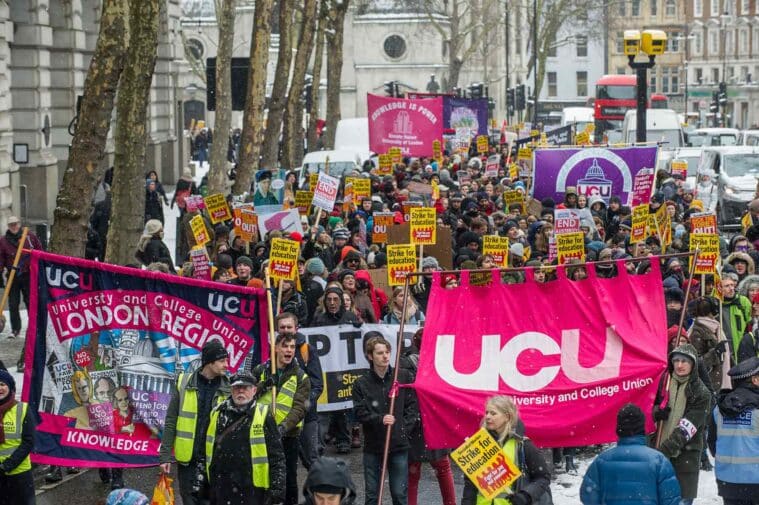

By Dara O’Cogaidhin
UCU members at 13 London colleges took two days’ strike action at the end of January in their fight for fair pay. This followed action taken by six colleges in November. Staff working in Further Education (FE) are among the lowest paid in the education sector. Years of below-inflation pay increases have seen the pay gap between teachers in colleges and schools grow to £7,000. Staff recruitment and retention in colleges are at crisis levels due to excessive workloads.
The Tory anti-union threshold of 50% turnout prevented the majority of college staff balloted in October from joining the strike action. In FE 85% voted for action on a 31% turnout. In some colleges the turnout was below 20% reflecting the enormous task facing union activists to rebuild confidence in the necessity of strike action following years of inactivity on the pay issue.
Strikes at more London colleges could be on the cards as ballots at Tower Hamlets College and Redbridge College opened on 11 February. Union activists mobilising the vote can point to the recent success of strikes at the Capital City College Group (CCCG) in London which saw members awarded a new pay deal worth 5% in November 2018.
This pay deal is worth £140 extra a month and the deal also included a new fractionalisation policy for all staff working for three years or more to be placed on a permanent contract. The CEO has also made clear that the college has an ambition to pay 3% plus inflation for the next two years. This victory followed eight days of strike action between February and May last year.
This historic deal was agreed after the October ballot. However the lessons of the CCCG dispute are clear for other colleges who did not meet the threshold to strike: members can be won over to actively support sustained strike action and they can win. The 50% threshold is a deliberate tactic to hamstring workers organising against low pay and insecurity but all branches should be re-balloted with a national campaign to build the vote.
UCU activists need to set up action committees in every college, across every department, to agitate around issues such as pay, workload and casualisation. The “partnership unionism” of the leadership, which assumes that employers are prepared to negotiate in good faith, has contributed to the disempowerment and pessimism of many members who have suffered a devastating cut of at least 25% in their real pay since 2009.
The fatalism of the leadership when it comes to strike action was clearly demonstrated in last year’s USS pensions strike when the general secretary Sally Hunt went over the heads of elected negotiators and forced the membership to vote on a new, ‘independent’ valuation of the pension scheme.
The leadership’s goal was more leverage in negotiation with the bosses but the strike radicalised the rank-and-file. Over 42,000 staff members went on strike over 14 days forcing the employers back to negotiations despite their initial refusal to do so. The UCU also recruited 16,000 new members during the strike.
Rank-and-file activists should reach out to other unions in FE and HE to develop a common strategy against pay ‘restraint’, casualisation and marketisation imposed by employers on behalf of the Tories. This needs to escalate to strike action across the whole education sector. The USS dispute and the CCCG victory have shown the collective power and resolve of the members. The task now is to build a combative union that encourages members to organise and lead.
The UCU Left are standing Jo McNeill for Vice President and a slate of candidates for the NEC election. Voting opens 1 February and closes 1 March.